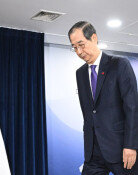[Editorial] For National Security Law, Partial Revision is the Solution
[Editorial] For National Security Law, Partial Revision is the Solution
Posted September. 14, 2004 22:10,
Two religious leaders have spoken out in opposition to the repeal of the National Security Law. Cardinal Kim Sou-hwan said, Revision is necessary, but repeal is too early. The president of the Jogye Order of Korean Buddhism, Beop-jang, said, Why dont we simply not use the law to violate human rights? The two leaders expressed their concerns over our national security and potential disruption to society in concert with the announcement a few days ago from a senior member group of our society that offered a declaration of our situation, reflecting the majority of peoples worries over the repeal of the National Security Law.
In fact, 70-80 percent of the nation, according to various polls, wants either to revise or to maintain the National Security Law. The Uri Party, which is pushing the laws repeal as its partys official stance, seems to be surprised by such public opinion. It was reported to be struggling to find a solution between the partys opinion and the peoples in its planning and advisory committee held yesterday. Yet, this is not something they should be surprised or anguished over. Everything will be all right if they adjust their party opinion of repeal according to public opinion
Ever since President Roh Moo-hyun called for the repeal of the National Security Law, this country has never had even one single quiet day. Conflicts between the ruling and the opposition parties have become intensified to the extreme. Civil organizations have raised their voice on the repeal issue as well, and are split into supporters of repeal and those against. Some of the organizations are planning to hold large-scale mass meetings along with petition drives. It resembles the situation last spring when the presidential impeachment was on everyones mind.
The current situation, which has no measures to resolve, should not continue. In order to avoid national disruptions, the ruling and the opposition parties should find a point where they both agree. If one looks into this situation carefully, the difference between the two parties opinions exists only in the packing of the law. It looks possible for them to compromise over the contents.
For example, the punishment for praise, encouragement, and possession of objects benefiting the enemy, which the Constitutional Court approved, should be maintained, but should be applied more strictly, while the articles such as extension of imprisonment, which the Constitutional Court disapproved of as a violation of the constitution because of its potential to violate human rights, should be amended. The two parties should be able to find a consent point to keep the symbolic importance of the National Security Law and still remove the poisonous articles contained in it. In the current situation, the right solution would be to maintain the law after partially revising it.







